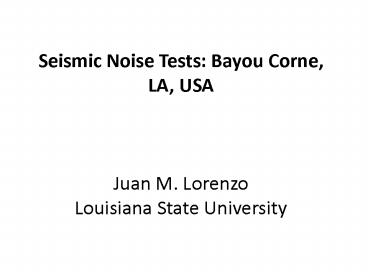- PowerPoint PPT Presentation
1 / 6
Title:
Description:
Seismic Noise Tests: Bayou Corne, LA, USA Juan M. Lorenzo Louisiana State University Bayou Corne and environs Site 1 Site 2 Preliminary summary-analysis of seismic ... – PowerPoint PPT presentation
Number of Views:22
Avg rating:3.0/5.0
Title:
1
Seismic Noise Tests Bayou Corne, LA,
USA Juan M. LorenzoLouisiana State
University
2
Bayou Corne and environs
Site 2
Site 1
3
Preliminary summary-analysis of seismic noise
tests at Bayou Corne, LA conducted9-22-12 to
9-23-12
- Goal To locate aquifer sands, which could be
charged with free gas. - What we know Shear-wave data indicate the tops
of two prominent reflector bodies (A and B).
The shallower body (top A) lies at 7-10 m below
the surface and the deeper body (top B) at
40-50 m below the land surface. - What we do not know gas content at the two
sites. - What we think we know Reflector B corresponds
to the top of aquifer sands and lies at a
shallower depth (42 m) east of Bayou Corne than
west of Bayou Corne ( 47 m). - Recommendations S-wave surveys (not sound-waves)
will be more successful than P-wave (sound)
surveys at imaging the shallow sand bodies in the
area. Seismic results should be cross-checked
with available geological and geotechnical
information. - Warning (s) Buried sand bodies are likely to
change their thickness and depth considerably
across the area so that the two seismic borings
shown here should not be linearly interpolated
with complete confidence.
4
Representative shear wave (not sound wave)
dataSite 2- (Dugas Le Blanc-1 property)
Distance between source and geophones (m)
Reflector A 10 m depth
Reflector B 43 m depth
Technical note Field data are displayed with a
constant rms amplitude and using an all-pass
filter. Maximum source-receiver offset is 192 m.
Refracted SH
Love
TWTT (s)
5
Velocity-versus-depth profiles at Site 1, S of
route 70 and W of Bayou Corne (Triche-1 property)
Technical notes Velocity values, derived using
semblance velocity analysis (dashed line) help
confirm best-matched forward ray-trace models
(continuous bold line). WT marks the interpreted
top of the water table.
6
Velocity-versus-depth profiles at Site 2N of
route 70 (Dugas-Le Blanc-1 property)
Technical note Velocity values, derived using
semblance velocity analysis (dashed line) help
confirm best-matched forward ray-trace models
(continuous bold line). WT marks the interpreted
top of the water table.































